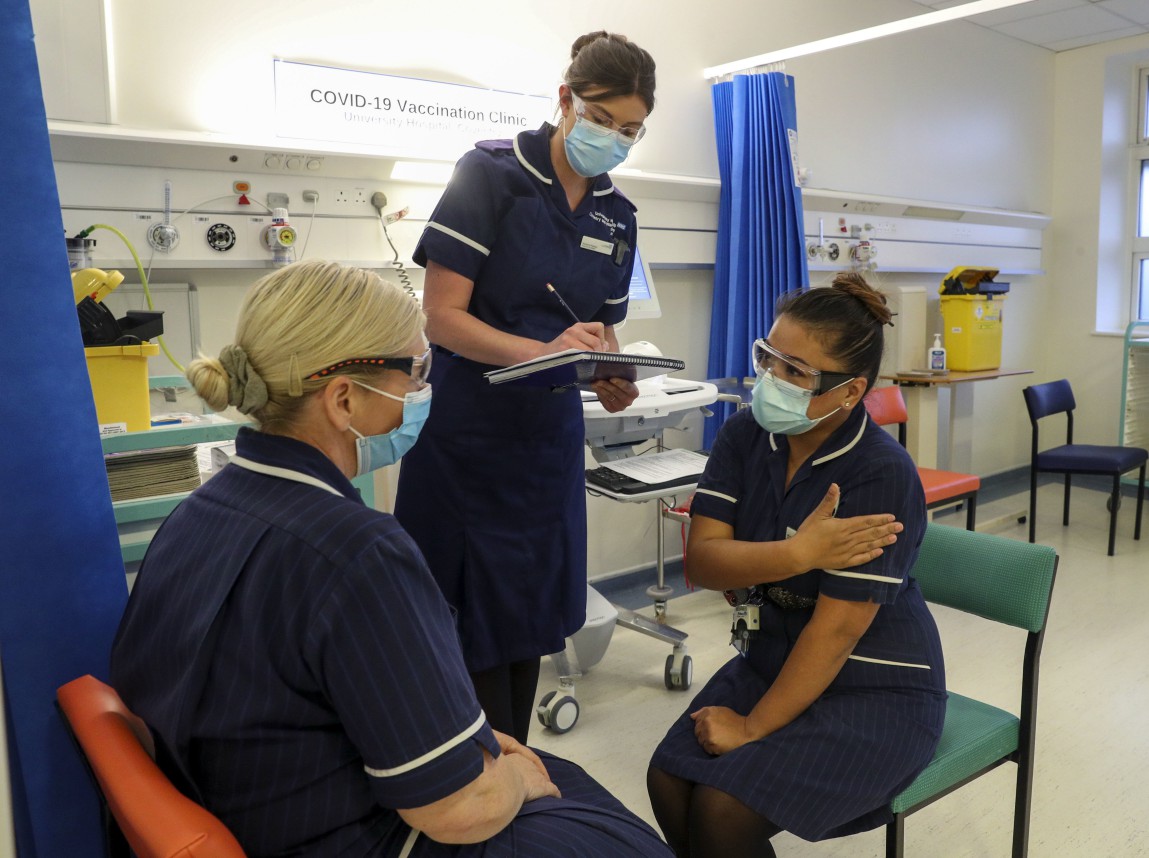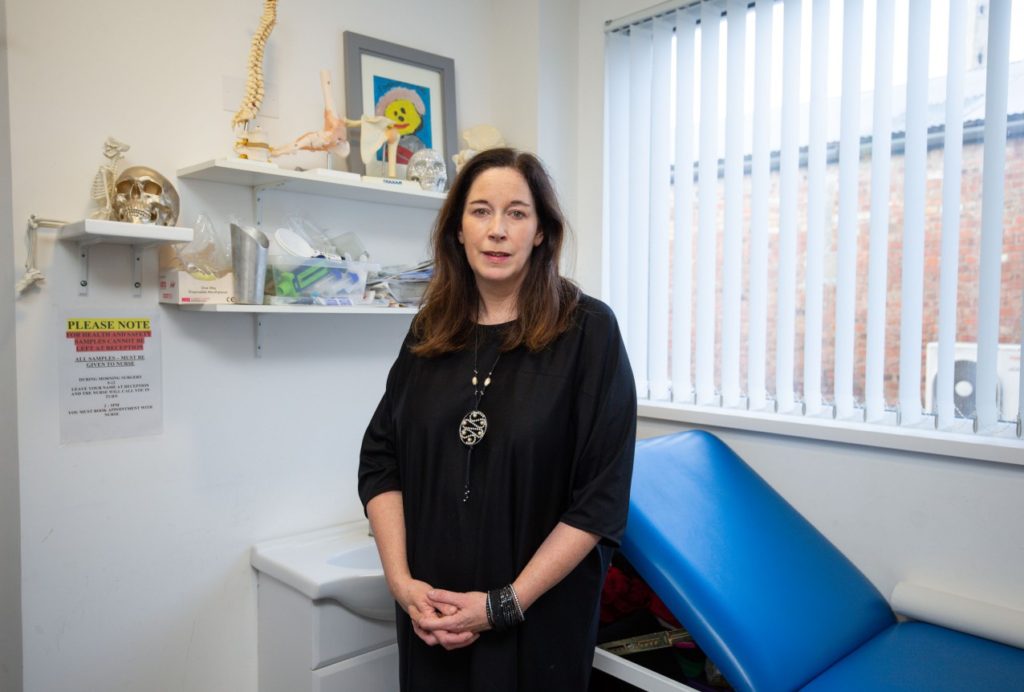By Michael O’Farrell – Investigations Editor
ELDERLY people living at home are in fear of being ignored for the Covid vaccine, just as nursing homes were overlooked at the start of the pandemic, their carers warned yesterday.
The alert comes after an EU report shows Ireland lagging behind on roll-out plans.
The head of Home and Community Care Ireland (HCCI), which represents care firms responsible for thousands of the elderly who are being prioritised for vaccination, said they have been snubbed by the Health Minister, Stephen Donnelly.
Chief executive Joseph Musgrave was due to meet Minister Donnelly about the roll-out on Monday but he told the Irish Mail on Sunday last night that the meeting has been rescheduled for mid-January.
‘I was told that he has no time to see me before Christmas,’ said Mr Musgrave, who fears vaccination roll-out will suffer delays because it has not been discussed in advance.
‘Basically this plan is being published without any reference to the sector, which is exactly what happened at the start of the first wave,’ said Mr Musgrave.
‘There doesn’t seem to be a distribution plan or even a willingness to engage. We’re back to where we were in late February where the Government is saying, “We know best and we’re going to tell you what we’re going to do.”
‘There are going to be different problems this time. I feel like we’re going to lose precious time after Christmas when we all want good news in the new year, and we don’t have a thought-through plan. That’s my fear.’
The 80 HCCI members across the country care for more than 20,000 homebound people in their own homes. But that’s just a portion of the many elderly and disabled citizens who are due to be prioritised for the vaccine, under the Government’s plan to be announced next week.
There are more than 120,000 people aged over 80 living in their own homes, many of whom are disabled and unable to leave. There are 28,000 nursing home residents and 30,000 carehome staff who are also expected to be first in line to receive the Pfizer Covid-19 vaccine from the beginning of January.
Last night Tadhg Daly of Nursing Homes Ireland said that following a meeting with Minister Donnelly on Tuesday he is confident nursing home residents and staff will be among those first in line. ‘They haven’t confirmed it but I think it’s fair to assume that residents and frontline healthcare workers will be at the very top of the list,’ he said.
The logistical challenge of distributing vaccines to the 500 private and public nursing homes in the State is substantial.
But it pales when compared to reaching the tens of thousands of elderly citizens who cannot leave home.
‘This is pure, raw logistics like we have never seen before,’ private ambulance firm owner David Hall told the MOS. He has offered his ambulances and other vehicles at cost price, but said the Government is not looking beyond the HSE.
‘Those types of logistical conversations haven’t been had,’ he said. ‘This is a mammoth undertaking and they need the expertise brought in from somewhere. No one organisation in this State has the capacity to deal with this vaccine roll-out. That’s the simple truth and until and unless everyone is involved it will be a disaster.’
Ireland is lagging behind in its planning, as was grimly highlighted this week by the European Centre for Disease Control (ECDC) which surveyed the roll-out plans of all EU nations, who were told as long ago as the summer to draw up plans.
Nine member states have published recommendations for priority groups. Electronic immunisation registries are in place in 13, and 10 have begun putting them in place. Germany and France are among those bringing back retired doctors. Other countries have plans to train vaccinators.
In contrast, Ireland did not respond to the ECDC survey at all, indicating an apparent lack of preparation that has alarmed those on the ground here.
According to Mr Musgrave, his counterparts in the UK have been engaged with their government about vaccination for two months.
‘The UK has been on this since September,’ he said. ‘We knew the vaccines were coming and I don’t understand why I’ve not been called into a meeting where they say: Look we’re going to need help to distribute this thing. How feasible is it for nurses to train homecare workers to do the jabs? I don’t get it.
‘My members are asking if we’re going to be asked to help administer the vaccine. If we are, how’s that going to be done? Should we be planning for this? These are sophisticated private companies. Some of them have delivery and logistics systems of their own. Some have warehouses. They all have vans and supply chains. So they could gear up to take part in the effort if anyone just talked to us. But it’s just radio silence.’
Mr Musgrave expressed concerns about the failure to do any blanket testing in the homecare sector.
Unlike in the UK, where homecare workers have access to rapid tests, Ireland does not blanket test them in the way nursing homes are tested. ‘What I’m worried about is we’re going to come up with a vaccine plan that doesn’t have a testing plan,’ he said. ‘You’ve got to plan for this as if the vaccine is going to protect you but not someone else from getting it from you.’
Mr Musgrave said that until vaccinations are confirmed to prevent transmission it is vital, in a sector where workers move between multiple houses each day, that testing be available.
‘Until we have the data we need to be planning for this as if we don’t know whether or not a vaccinated healthcare worker will pass on the virus, in which case they’ll still need to test themselves regularly and rapidly to make sure they’re not inadvertently passing the virus on to clients.’ He said he had been told ‘repeatedly, over and over again’ that the HSE will not begin blanket testing the homecare sector because they don’t believe the evidence supports routine testing in homecare.
GPs Warns Of Problems With Vaccines Roll-out
‘I don’t know how we’re going to do it. I just feel it’s going to be really difficult for the ordinary GP to do,’ said Dr Illona Duffy.
The Monaghan GP, who has already warned that many overworked GP practices face collapse this winter, said she had real concerns about their ability to spearhead a mass Covid vaccination campaign.
A complicating factor is that those inoculated will be asked to stay for 15 minutes’ observation. ‘That’s just not going to be possible for most GPs with social distancing.’ To speed up the process, she suggested the drive-in model be adopted. ‘People can sit there in their car and be monitored that way.’
‘Give One Jab To Relative Too’
ONE relative of those in communal care should be prioritised for the jab along with the resident, Nursing Home Ireland has said.
Chief executive Tadhg Daly wrote to the HSE and Department of Health this week seeking the measure, and he told the Irish Mail on Sunday: ‘They weren’t saying absolutely – but they weren’t saying no either.’ With Ireland’s 28,000 nursing home residents and 30,000 carehome staff set to be among the first to get the jab, he said vaccinating one nominated visitor at the same time would not be a logistical burden. ‘If you have an 80-year-old resident, the chances are his or her spouse is that age too.
‘You have nursing homes from Castletownbere to Carndonagh and everywhere in-between so the likely scenario is you’d bring the vaccine to the home and vaccinate residents and staff at the one time,’ he said. However, that would depend on the amount of vaccines Ireland receives at first allocations, a figure not yet known.
The proposal could address a likely drop in Covid-19 vigilance, a problem identified by Home and Community Care Ireland chief executive Joseph Musgrave.
‘Vigilance could drop once people start getting vaccinated and families and loved ones may want to visit clients and their loved ones once vaccines start getting rolled out,’ said Mr Musgrave.





